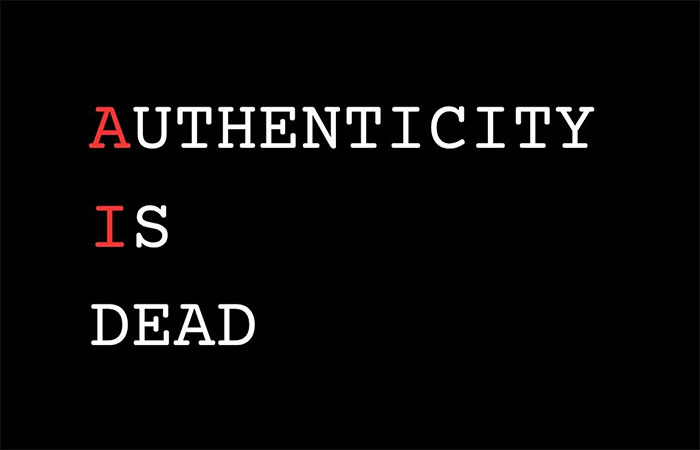(Cache #254)
By Andris Pone, President, Coin Branding Inc.
It used to be all about authenticity. Now it’s all about faking it.
What happened?
Ted Matthews, Simon Sinek, Brené Brown and many others made “purpose,” “authenticity,” “vulnerability” and “having a why” THE branding buzzwords of the past 20 years. I have been very much in that same camp.
Then AI happened. Then ChatGPT happened.
Now I see advisors making AI-generated posts on LinkedIn.
Now I receive cover letters – for WRITING jobs – obviously composed by AI. Their fake authors, when confronted, defend the propriety of using it – and defer (disingenuously or not) to their professors, at our institutions of higher learning, for embedding in them the attitude that AI is an appropriate tool to use in this context.
Now ChatGPT can write all of your social and other content, along with your mission statement and your brand tagline and your new brand name, all of which will be utterly undifferentiating, principally because it will not – cannot – be based in authenticity.
The end result is that many advisors and other brands are more generic than ever, and every one of them risks becoming so. Meaning they give no one any reason to do business with them instead of someone else.
But something else has happened in parallel, and it is quite exciting. It is the result of two things that have happened in Canada in particular: Trump and our recent federal election.
Donald Trump, and the Canadian federal election campaign, inspired an explosion of political opinion on LinkedIn. This content attracted unprecedented engagement.
I am not saying that you should necessarily write or speak about politics as part of your marketing efforts. I am saying that people are hungry for the opinions of others. They want to know what you think.
Consider Tony Chapman. Tony has built and sold two ad agencies over his storied career and been inducted into both the Marketing Hall of Legends and the Canadian Marketing and Advertising Hall of Fame. Before the election campaign, his posts alternated between the promotion of his RBC-sponsored show, Chatter that Matters (in which he interviews people who’ve overcome challenging circumstances to chase their dreams) and posts about politics.
His Chatter That Matters posts were doing very well indeed, attracting likes roughly in a range from 20-100 and comments from 15-50.
And his political posts, which he interspersed with the Chatter That Matters content, tended to do even better.
During the election, he focused more intently on political posts, writing opinion pieces about Trump’s threats and what the Canadian response should be, making clear his view that the Conservatives should win, while at the same striking an inclusive tone that is his hallmark.
Suddenly the likes and comments skyrocketed, to the area of 400-1000 and 200-400, respectively. People were stampeding into the comments – which is where the magic really happens, by the way – and letting fly with their views in a manner that would have been considered decidedly un-Canadian mere weeks before.
I experienced something similar during the campaign. I posted on LinkedIn my view that Canadians need to preserve Canadian spelling, an argument that one might think would elicit crickets – but which went viral, attracting a range of heartfelt and well-considered comments from many people I did not know, totalling 275 likes, 160 comments, and more than 35,000 impressions.
Those are viral numbers, meaning that many of the commenters were people I had never heard of before. They were a new, incremental audience.
Here’s your opportunity to stand out from the advisor masses, who, thanks to AI, are more generic than ever (and that is REALLY saying something):
- Express a POV. I know you have a point of view on things. It doesn’t have to be politics, by any means. In fact, it should probably be about the unique value you add for your clients.
- Get personal. You don’t have to overshare. But conveying your personal beliefs, and including a photo or video of yourself, is what your audience wants to see. They want to see someone they like, and that person is you.
- Think about launching a podcast or video series with you speaking unscripted (watch for mine). Especially if you are interviewing someone or a sidekick is chatting with you, they are a brilliant and surprisingly easy way for you to convey the real you – and without even saying it, why someone should do business with you instead of someone else.
Authenticity is dead? Long live authenticity.




